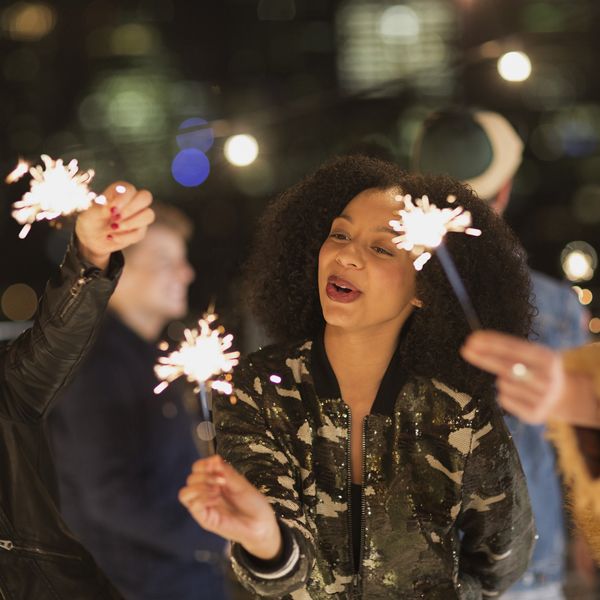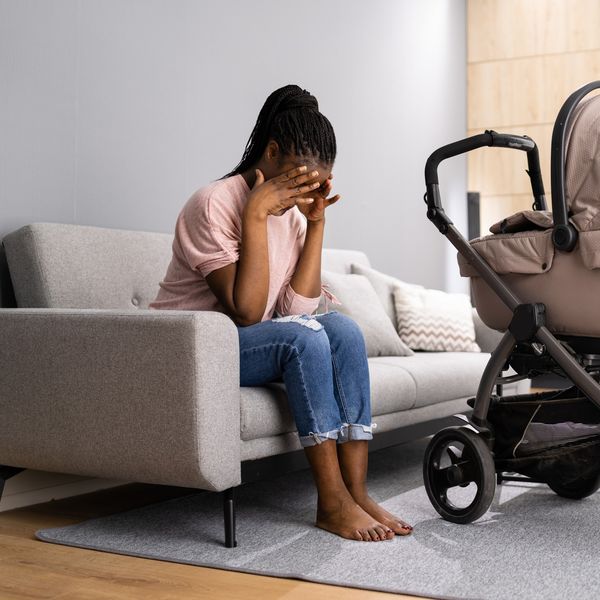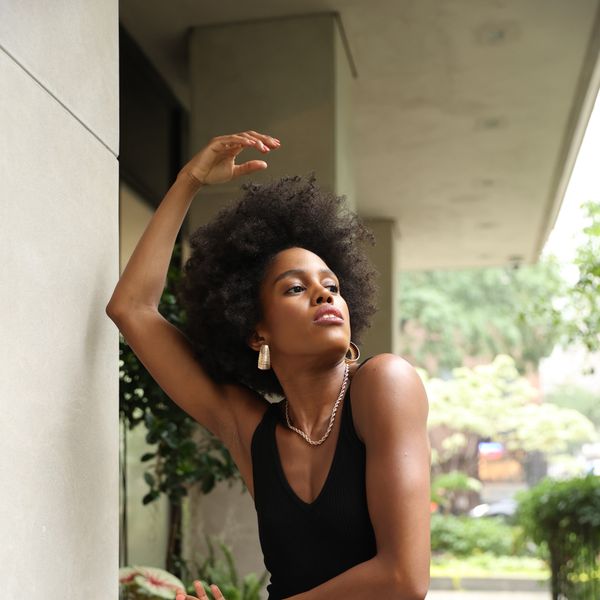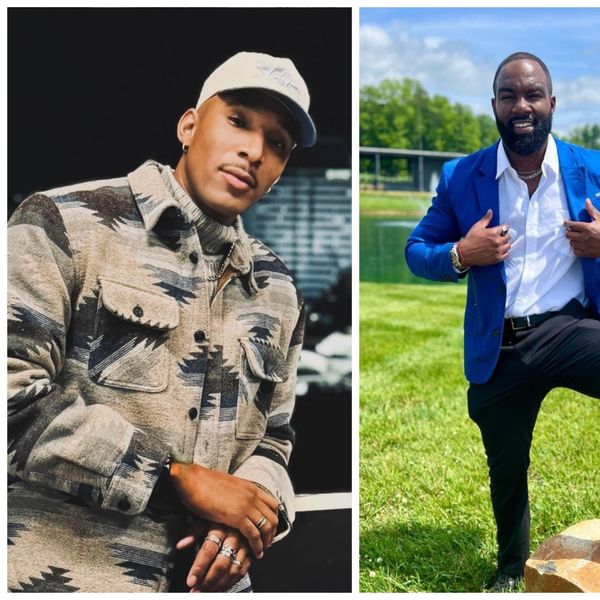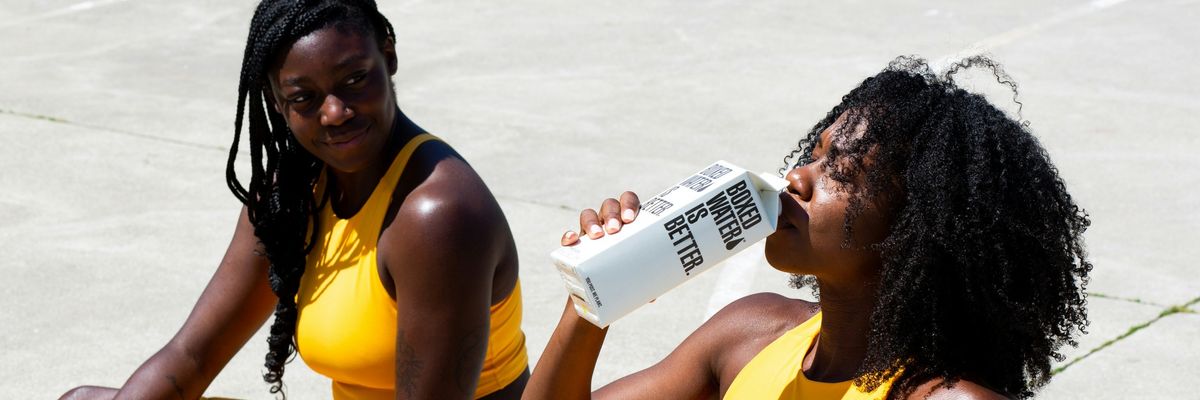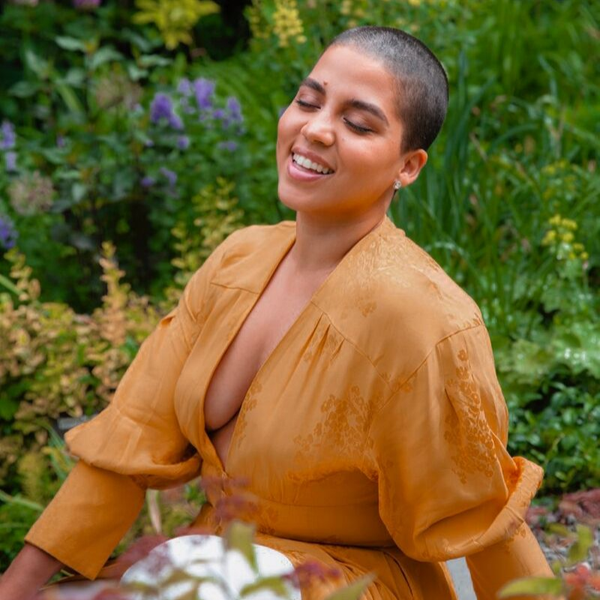
Self-love can be the best love but most of us have had to go through a journey of self-hate, or at least intense dislike, before we reached the pot of gold on the other side. From loving ourselves at any size to embracing the quirkiness we can't seem to shake, we were all built and wired differently for a reason. And the sooner we welcome this and all that comes with it, the better. The best part? We're not alone. As women, we are all on our own journey of getting to a space where we love ourselves and embrace all that we are.
Seven women have bravely and vulnerably shared their journey of self-love, what they've had to go through to get to a healthy space, and how they make sure it never leaves their side and life.
Melanie Santos
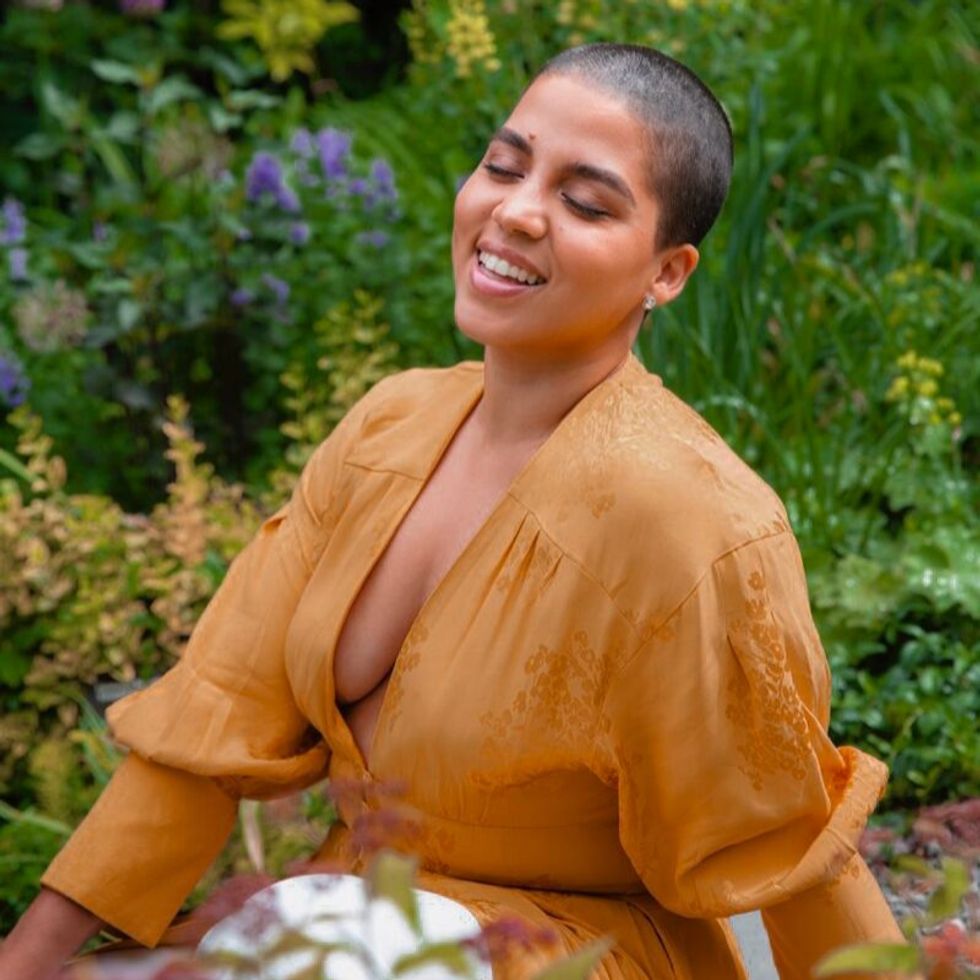
Photo by Taylor Perez
"Self-love is undoubtedly incredibly necessary to a person's well-being."
I think the term "self-love" is incredibly saturated right now, so it's important to give yourself the time and space to define what it means in your own life, that is, without getting stuck in surface-level wellness practices like manicures and solo-dates. I like to pamper myself as much as the next person, but to me, self-love means finding the courage to dive into the deepest, darkest parts of your relationship with yourself. It's becoming comfortable with your shadows and listening to and nourishing your mind, body, and spirit accordingly.
I struggled with loving myself for most of my life due in part to subconscious conditioning from my upbringing and just being a young American girl growing up in the 90s; a time ripe with societal pressure to believe and consume, consume, consume.
Growing up in a traditional Latinx-Caribbean family, I was predisposed to having a contained view of what wellness looked like for "people like us". Severely important topics like mental health were kept hush-hush unless it pertained to major events like a mental breakdown or suicide. I grew up believing that therapy was only for "crazy people".
Years of unaddressed anxiety, depression, and panic attacks prevented me from loving myself fully and not loving myself prevented me from having healthy relationships with others. It wasn't until I had my own mental breakdown where I was debilitated for over a week with anxiety and suicidal thoughts that my family considered that I might actually need help.
Over a decade later, I am still healing through self-care practices like therapy, eating more whole, plant-based foods, and spending honest time with myself, but I have fully acknowledged that there is nothing wrong with me. I love myself fully even though my mental illnesses are something I have to navigate daily. Knowing that I am worth a love that fills every part of me has allowed me to heal my relationships, including the once painful relationship with my husband. Remembering who I am and loving myself like I know it is a full-time job, one that I'm now well-versed in.
Self-love has evolved with me through the years. I am a mother to a beautiful, brilliant brown-skinned girl now, so knowing that my self-love will influence how she forms her thoughts about herself and love, I am deliberate about loving every part of me. Aside from doing the work at home, I've created a career around holding safe spaces to talk about self-love and the dark, uncomfortable "symptoms" that come with it. I take pride in being vulnerable with the world as a way to teach the world to be vulnerable with themselves. That's how important self-love is to me.
Ashley
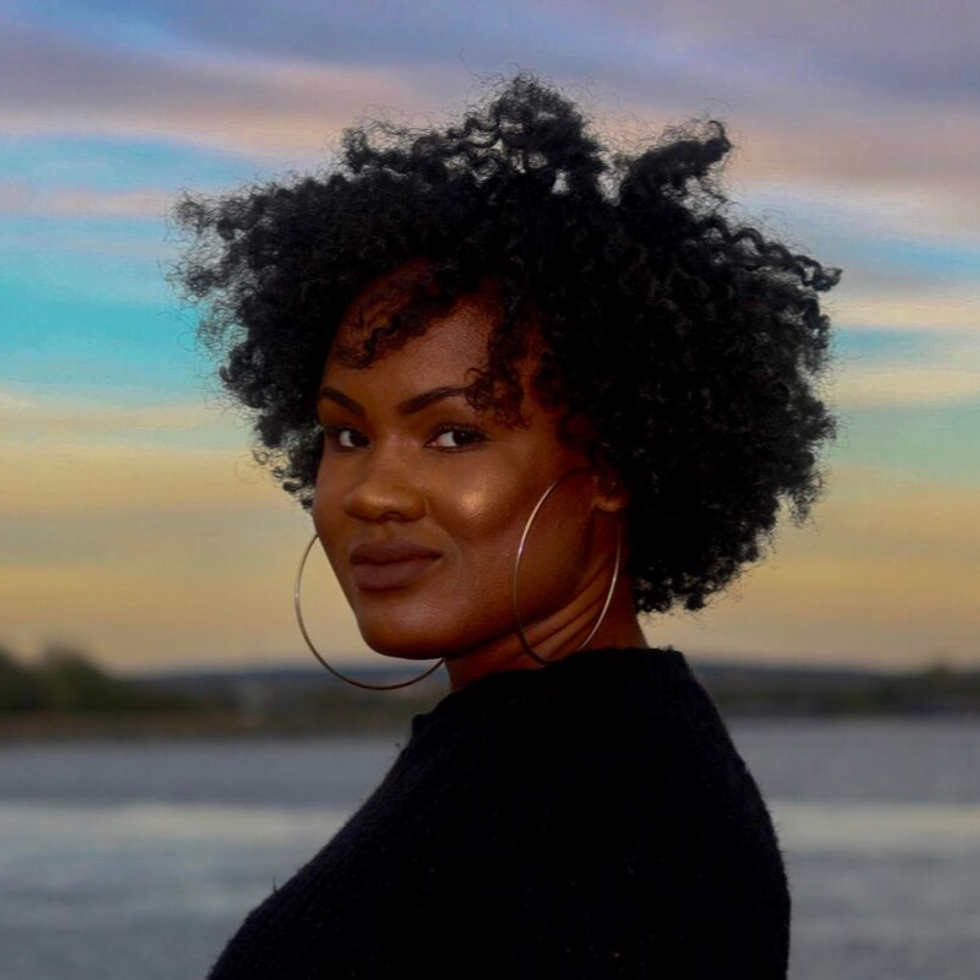
Photo by @lifeasro_
"Self-love is having self-respect, confidence, and truly being happy with who you are as a person."
When my dog passed away, I was really depressed and started eating to take my mind off things, thinking it would make me feel better. I began to gain weight and became so disgusted and disappointed in myself because I couldn't fit any of my clothes anymore and I had no one to blame but myself. I stopped taking pictures of myself and started declining invitations to go to events unless I really had to go because I hated how I looked.
I realized that the only person standing in the way of me getting back in shape was myself. I wasn't putting the right food in my body, so I took the initiative to start juicing and working out regularly. I also realized that just because I gained some weight didn't mean I wasn't beautiful. I accepted myself at the stage I was in and really pushed myself to start to get back to how I used to be. I am still not where I want to be yet, but it's a process.
Now, I'm intentional about practicing self-love regularly. I always try to start my day by thinking about one thing that I am grateful for. I also celebrate my wins, no matter how big or small they might be and honestly, I am very patient with myself. I have the tendency to be very hard on myself, so I take moments to acknowledge my persistence and truly appreciate where I am now because it's so much better than where I was years or even months ago.
Charmaine Charmant
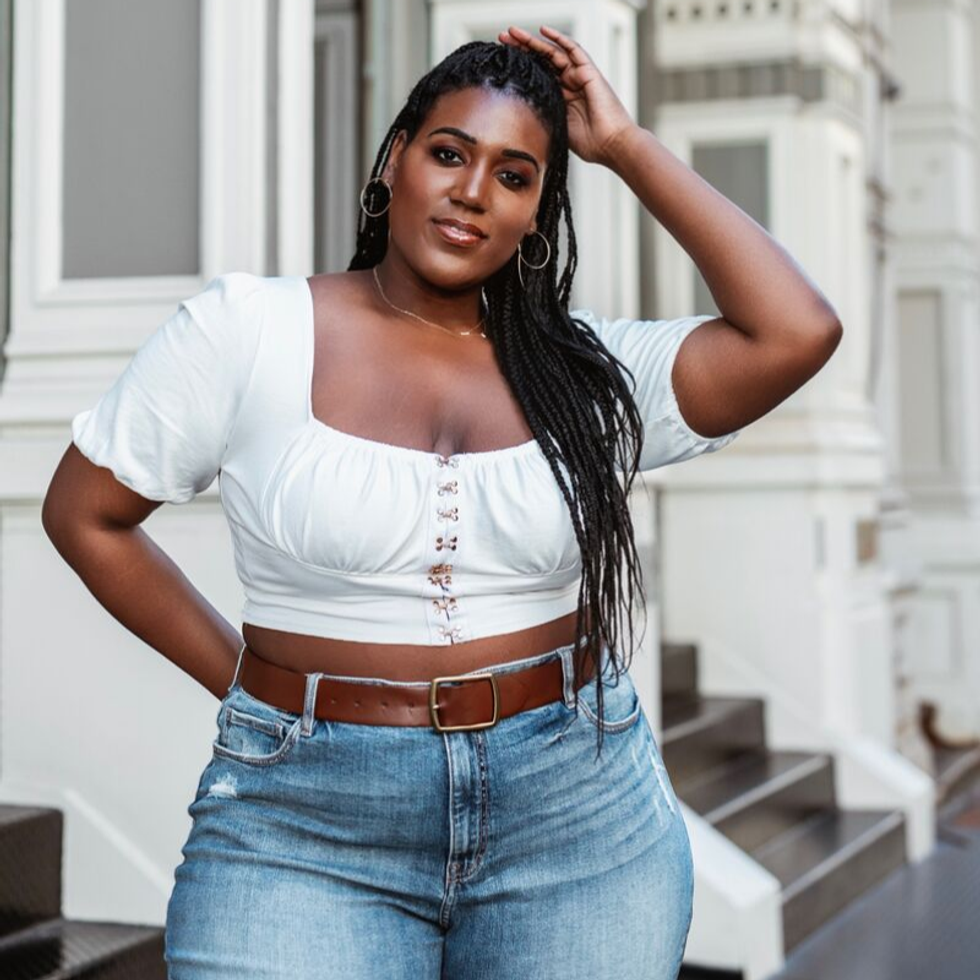
Photo by Victoria Saperstein
"To me, self-love means loving yourself unconditionally. It means embracing your individuality and trusting yourself to forge your own path with confidence."
If there's anyone that understands how difficult it can be to love the skin you're in, it's me. I don't think there was ever a time in my life that I wasn't aspiring to reach a goal weight, but I struggled the most in my late teenage years.
When I entered my first year of college, my obsession with weight loss hit an all-time high. One winter break while I was home in NYC, I made my way up to Washington Heights to visit a doctor who wrote diet pill prescriptions for anyone that could shell out $60. The pills essentially suppressed my appetite, and they were not FDA approved. You would take the pill, have coffee for breakfast, and eat spinach with 8oz of meat for dinner. That was it. I followed the diet and spent 45 min in the gym every day; it was such an unhealthy time in my life. My family begged me to stop, my doctor ordered me to stop, and only my closest friends knew what I was doing. I was in that routine on and off for two years.
It took me a while, but I realized I was trying to fix something that wasn't broken. I was so lost in my thoughts that I never stopped to appreciate the abundance of what I had: a beautiful, well-functioning body that was showing up for me every day. It also hit me that I would never be as young and beautiful as I am in the present moment. I used to have random flashbacks to my skinniest moments and think about how crazy it was that in those moments, I was still obsessed with losing weight. That was another major turning point because it made me realize that I had to change the narrative moving forward. I committed to honoring and loving myself no matter what.
It didn't happen overnight. Like all things in life, loving myself required work. Everything is connected, so learning how to listen to my body and follow its lead was important. I started paying attention to everything; the people I was surrounding myself with, the media that I was consuming, and how different situations made me feel. I eliminated all the bad energy in my life and stopped frequenting spaces that made me feel undervalued. I engaged in physical activity that made me feel confident and rested when I needed to.
I am so happy that I learned how to love myself unconditionally. Not only am I healthy, but I now have these amazing memories of embracing my body and empowering other women, which are some of my proudest moments!
To me, self-love means loving yourself unconditionally. It means embracing your individuality and trusting yourself to forge your own path with confidence. It means working towards achieving your wildest dreams with no shame. It means doing the work now so that you can look back at yourself in the future with no regrets.
I embrace self-love by seeking out what happiness means to me as an individual and developing a checklist tailored to my specific needs. I don't need to look like anyone else, obtain the same credentials, or live my life according to anyone else's standards.
LaKeidra
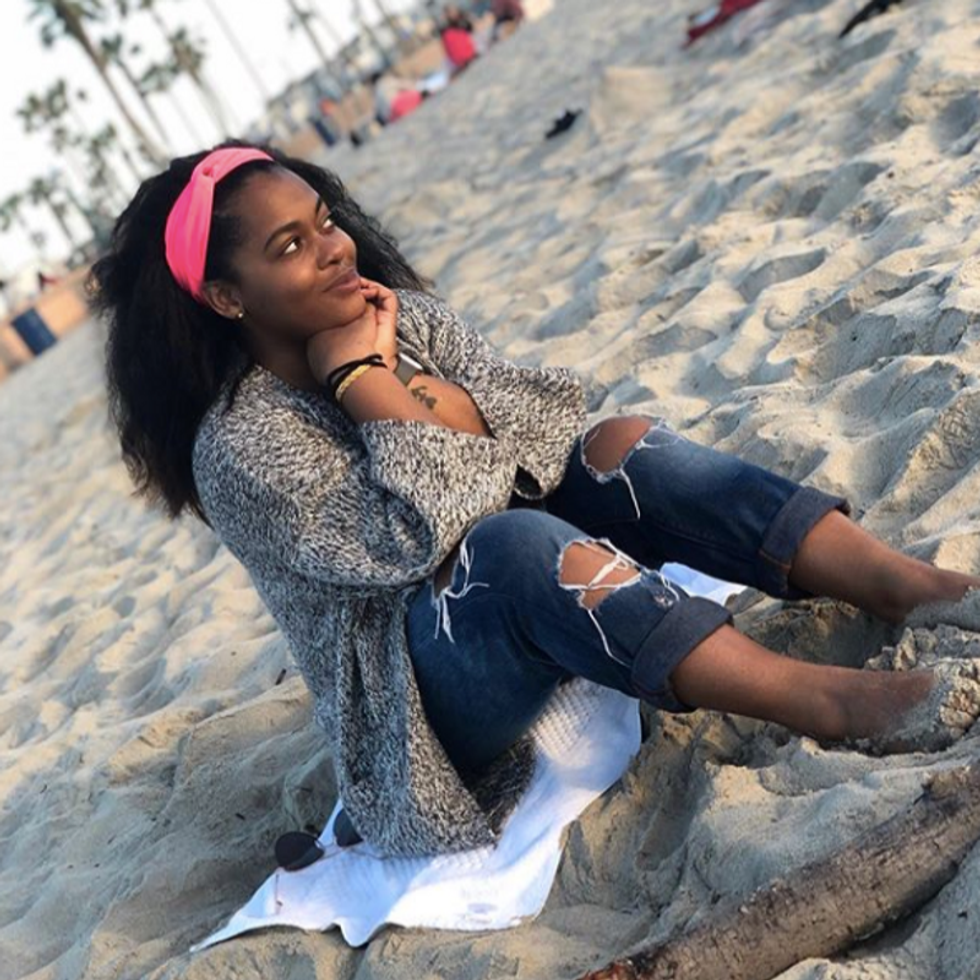
Courtesy of LaKeidra
"Self-love is a constant journey."
I've had many moments in my past where my physical appearance caused me to have a difficult time loving myself, even recently. In addition, being in my early 30s and still working through my personal expectations of "where I should be" has also caused me to get down on myself from time to time. It's important to note that self-love isn't just about loving how you look.
Self-love revolves around acceptance and honesty for me. It's accepting who I am, where I am and how I show up. But it's also being honest with myself in instances where I am capable of more or deserve more. It's a balancing act and is about being in tune with yourself and your needs at any given time.
Going to therapy is key! It helps me confront the beliefs I have about myself and think about the practices I engage in day-to-day without knowing. Due to therapy, I have been able to be more self-aware and notice when I'm not feeling my best. When I notice, I take time for myself to breathe, calm my anxiety and affirm myself and then come up with a plan of action if needed. Literally this weekend, I sat down and took a few hours to refocus because I felt myself getting into old habits of comparing my journey to others and feeling less than. It definitely helps to pause and be present. I'm still working on it, but I'm taking control of my life as much as I can.
Miata Shanay
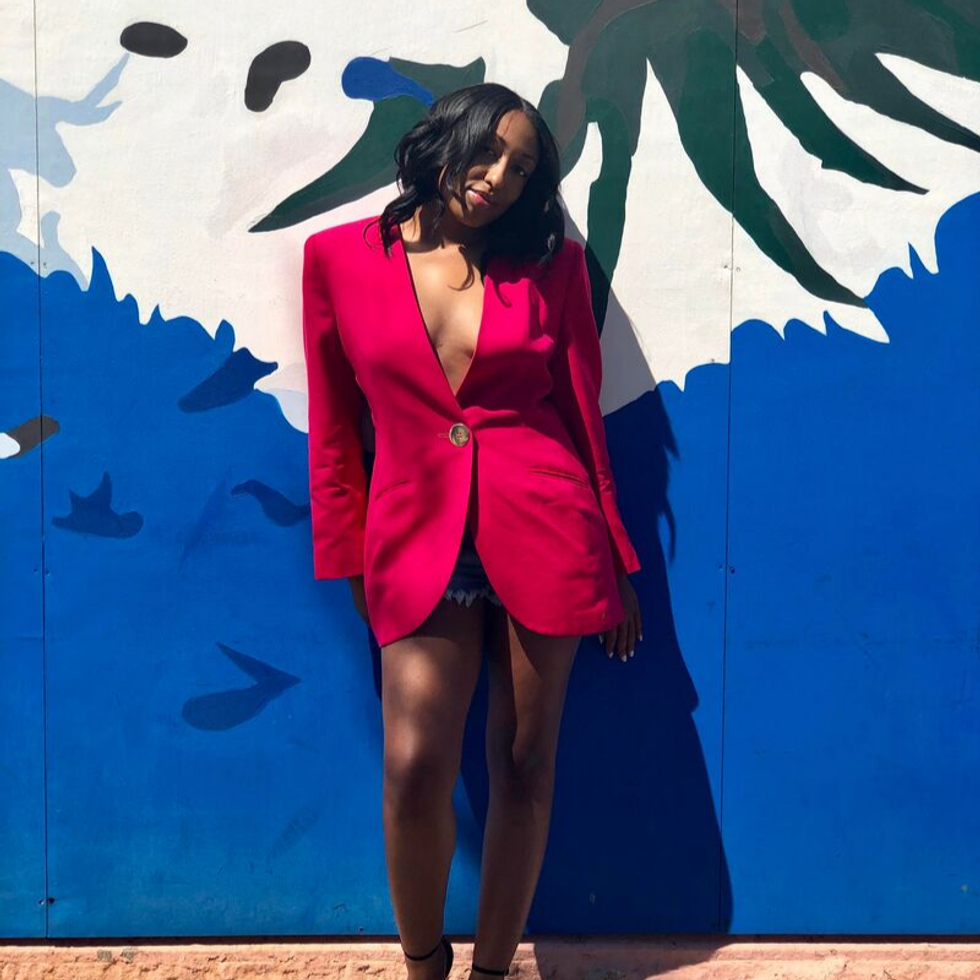
"As a whole and healed person, I know self-love to be caring enough about myself to unapologetically discard anything that doesn't hold me in the highest regard."
It's funny because about four years ago, I thought "self-love" was a concept people were using just to pawn off on me because I was going through a break-up. It felt like a send-off or a dismissal. Now, as a whole and healed person, I know self-love to be caring enough about myself to unapologetically discard anything that doesn't hold me in the highest regard. Anything that treats me or makes me feel less than? Gotta go! That's friends, jobs, sex partners, AND pants sizes! It's also being grateful for what I've been blessed with. Oftentimes, we long for something more when what we have is enough. His grace is sufficient, and so are my small boobs. They're fine how they are!
I've totally struggled with self-love before. I had no idea where to start because as a teenager, I'd become so attached to the idea that a significant other validated me. I thought, "If this kind of guy chooses me, that means I'm worthy. That means I have permission to feel confident." So, when I got in a relationship with a narcissist and he constantly critiqued and compared me to other women, I longed to be like those women because it'd satisfy him and validate me. NO MA'AM! Never again! Men will have sex with a bottled water; they don't care! Why should I base my confidence on some man?
I overcame my struggles with self-love by doing the work. First, you have to be willing, and I knew the way I treated myself (staying in a narcissistic abusive relationship, ripping myself to shreds in the mirror, skipping meals, etc.) wasn't working for me. It was only adding to my destruction. So, I watched more Iyanla, I read more books, spent time with people who love me unconditionally, I went to church, journaled, and I masturbated. I really did my work. The "work" looks different for everyone.
I still aim to embrace self-love by appreciating all stages of myself. Sometimes when I take my weave out, I have a beat of nervousness because I've grown used to the way I look with a Kardashian middle-part. My natural hair is a short bob. And I have to literally tell myself, "This is beautiful, too." I'm constantly working on re-wiring my brain to work for me and not against me due to my past relationships, and I feel like it's working for me. I'm proud of myself!
Jalysa
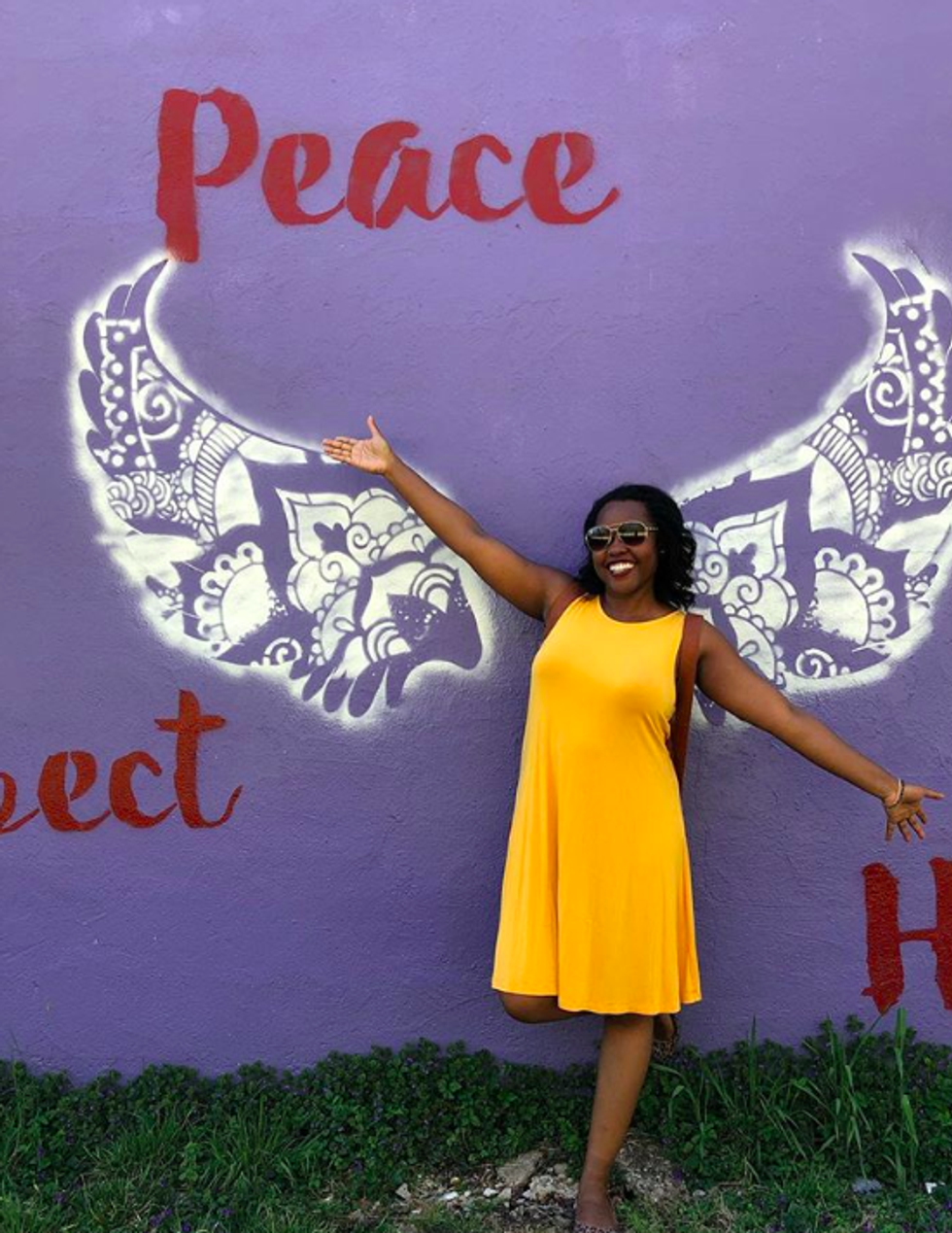
Courtesy of Jalysa
"I make time for the things I love and bring me joy. On the flip side, I take myself out of situations that do not serve me well. I think a big part of self-love is setting boundaries and doing what is best for you."
It is really easy to embrace the things we like about ourselves or feel great when we're really good at something. It's also a really beautiful thing to acknowledge and love our "flaws" because they are unique to who we are as a person. Self-love is accepting myself, flaws and all! It's also taking the time to do things that make you happy. Whether it's getting rest, doing your favorite workout, or spending time with loved ones. We are the best version of ourselves when we are happy.
I've been on this journey to self-love/acceptance since I was in high school. There was a point in time where I wished I had a lighter skin complexion, smaller lips, and was two sizes smaller. I really struggled with body image and my appearance for a long time. There have also been times where I felt like I never "fit in" and it really took a toll on my self-esteem. With social media being so big these days, it's easy to compare ourselves to others which is a terrible cycle to get stuck in. Thankfully, there are a few different things that have helped me over the years.
For starters, I am a huge advocate for therapy and know that it has helped me tremendously. I can tell a difference when I go more consistently. The company we keep is also extremely important for numerous reasons and I became very intentional with who I spend time with and energy on. I also made it a point to surround myself with more Black women. It was honestly something I never knew I needed but has been such an amazing life change for me.
I look at how far I have come over the years, and that alone makes me proud of who I am. We all have different struggles; but when we look back and see that we overcame them, who wouldn't love that? I try to surround myself with positive, uplifting, inspiring people and it makes such a difference. I make time for the things I love and bring me joy. On the flip side, I take myself out of situations that do not serve me well. I think a big part of self-love is setting boundaries and doing what is best for you. I take all of these things into account often and I truly believe that I am the best version of myself these days. Once I started implementing them, I noticed that others started telling me, "You look happy." That is one of the best compliments you can receive.
Keisha Nicole
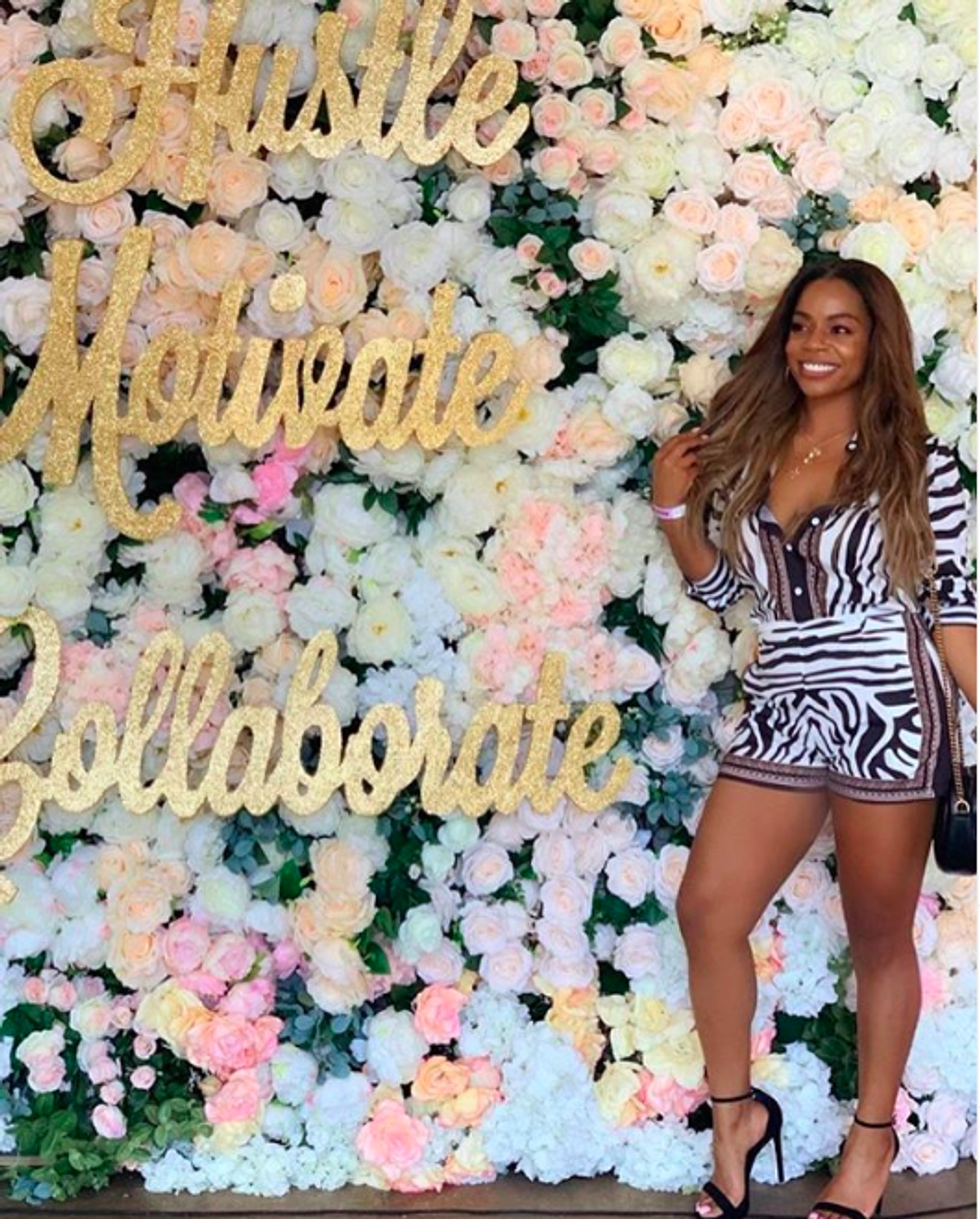
Courtesy of Keisha Nicole
"Self-love for me today is being sensitive to what I need, when I need it and just giving in to ME."
It's work. It's not a diet, it's a lifestyle. It's less self-pity and more of mastering self-control and not allowing your thoughts to consume you negatively. It's appreciating the scars and turning them into beauty marks.
My struggle started with my family. My cousins are mixed with Black and Hispanic and my side of the family is 100% Black. I didn't always feel like I fit in because some of my cousins are lighter-toned and I wanted to be like them. As a young girl, I couldn't understand why I wasn't mixed like them. Then, I was from one of the only two Black families at my elementary school and again, I wanted to be what I saw around me. I can vividly recall the sting I felt one day at school when a little girl said to the kids around me, "Don't play with Keisha, she's a Black girl!" That truly affected me.
I also grew up as the chubby girl. I didn't have the most confidence, so I found other ways to make people like me which was through my personality. I was truly shaped mentally and emotionally by what people thought of me. That's where my struggle with self-love stemmed from.
I think one of the funniest comedians is Katt Williams. People give him a hard time or think he's crazy the way he speaks his mind, but he said something that resonated with me and should with anybody. During one of his standup comedy shows, he spoke to the women about self-esteem and said, "It's called SELF-ESTEEM... esteem of yourself!" That's where self-love begins or is taken away; when we're looking for it outside of ourselves, that influence or stripping of our identity can happen early. And you don't know this when you're a little girl, but over time and the older you get, you really start to see how it's shaped you in the wrong way. So, I had to really reprogram my mind, reprogram my thinking.
I took a step back and realized that I was throwing myself into like-relationships that didn't deserve me. I've always known that I had this really dope energy, but it just seemed like everything around me was sucking that energy FROM me. I literally started throwing myself into work. I became the ambitious, over-achieving, competitive and just "all-in" chick.
When I got my first big break, I left a radio station in L.A. and relocated to Louisville, Kentucky. I created an anti-bullying campaign for kids who were bullied. I knew how it felt to be talked about, judged or left out by other kids for what you didn't have or how you looked. The most pivotal moment of that experience was sitting with that same group of kids afterward, discussing what we had been through. It was supposed to be for the kids, but it ended up being life-changing for me.
Part two of me overcoming was when I started valuing myself and getting into shape. It wasn't about just losing weight, it was about the discipline. Getting disciplined in this one particular area of my life really helped me discipline other things, like my emotions and the people I allowed into my space. I was able to get clarity and focus on just ME. This is when I started learning to truly love ME.
Today, I practice self-love by saying no and not settling for less in one-sided relationships. There were times when I didn't love myself enough, I would stay in a situation where I KNEW someone didn't value me. When I think back on it, I'm glad that despite how I was feeling, I would wake up and tell myself every day that I'm a boss and push through; I had to do that for me and over time I grew stronger. I continue to protect myself from anything that makes me feel less than and I try not to allow any negative energy into my space.
Through my journey, I learned that self-love is unconditional. You have to be patient and you have to be kind to yourself. I value the simple things and make sure that I give myself mental breaks (so underrated). Even if that's just waking up on the weekends to take a bike ride. Self-love for me today is being sensitive to what I need, when I need it and just giving in to ME.
Featured image courtesy of Taylor Perez
Originally published on October 10, 2019
- How To Give Yourself A Break - xoNecole: Women's Interest, Love, Wellness, Beauty ›
- Two Month Leave From Work Mental Health - xoNecole: Women's Interest, Love, Wellness, Beauty ›
- How To Cultivate Better Self-Worth - xoNecole ›
- The Ultimate Self-Care Checklist, Take Care Of You - xoNecole ›
Your December 2025 Monthly Horoscopes Are All About Surrender & Alignment
December is about letting go. We end the year with the need for more peace, reflection, and rejuvenation, and that is exactly what December is providing for us. The Sun is in Sagittarius, and anything is possible. This is the month to believe in that and to know that the universe is supporting you. With a Supermoon in Gemini as we begin the month as well, we have an opportunity to gain the closure we have been looking for this year and to wrap up old projects, ideas, and communication breakthroughs.
This is the month to make your peace the priority and let go of trying to control the way the tides are turning. Trust in your new beginning, and give yourself time to prepare for it this month.
A big part of the clarity that is coming through this month is due to Neptune going direct in Pisces on December 10, after being retrograde here since July. With Neptune now direct, we are able to see our inspiration and creativity a little more clearly, providing the perfect energy for dreams and manifestation to be built upon. The smoke is clearing, and it’s up to you to decide what you want to do with this newfound clarity that this transit is bringing. Mercury also moves back into Sagittarius on December 11, which is great for communication and clarity, and the adventures you were trying to see through at the beginning of November come around for you again with greater purpose and support.
On December 15, Mars enters Capricorn until the end of January 2026, and this is the extra push we need to make important changes and to be on the path towards greater abundance, stability, and prosperity. Mars in Capricorn takes care of business, and we have extra energy at our disposal during this time to do so. This transit is an ideal time to focus on your career or financial goals for next year and to start putting some of these plans into motion now. A few days later, we have the New Moon of the month, which will be in Sagittarius on December 19, and this is the perfect New Moon to manifest.
The energy is high, magic is in the air, and it’s all about moving forward with the new beginnings that are inspiring you and bringing you joy to think about right now.
Capricorn Season officially begins on December 21, and this earth sign energy is how we heal, gain closure, and build new foundations in our world. With Venus also moving into a Capricorn a few days later, there is something about peace, prosperity, and security that we are gaining in life and in love as we close out the year, and this is what we need right now. This month is about reflecting on what was, letting go of old hurt, and renewing. December is an ending and a new beginning in one, and there is magic in this space to be created.
Read for your sun and rising sign below to see what December 2025 has in store for you.
 AriesKyra Jay for xoNecole
AriesKyra Jay for xoNecoleARIES
December is a full-circle moment for you, Aries. You are seeing the gifts in your world and have a lot of gratitude for the way things have come about for you as of late. There are culminations in your world that are providing you with more abundance, stability, and community, and you are exactly where you are meant to be this month. With the Sun in a fellow fire sign and in your 9th house of travel for most of the month, December is a good time to get out of your comfort zone, explore the world around you, and get your body moving.
Mars, your ruling planet, also makes a change and moves into Capricorn on December 15, which will fuel your inspiration and power in your career space. You are making a lot of professional progress as we close out the year; however, make sure to be more mindful of your competitive drive right now. The New Moon on December 19 is the perfect opportunity for you to create some new plans and goals when it comes to traveling, education, and where you want to gain some new inspiration in your world. Overall, this is a month of things coming together for you serendipitously.
 TaurusKyra Jay for xoNecole
TaurusKyra Jay for xoNecoleTAURUS
December is about trusting your intuition, Taurus. You have a lot on your mind this month, and it’s best to delegate, communicate, and allow yourself some relief by opening up to someone and not feeling like you have to hold everything in. As we begin the month, we have a Supermoon in Gemini happening in your house of income, and the plans and projects you have been building here come to fruition for you now. This is the time to gain clarity on your financial world and to take a look at what spending habits you want to let go of here as well.
With Venus in your 8th house of shared resources for most of the month, you are doing a cleanse on your commitments, partnerships, and business ventures. You are taking a look at what you want to dedicate yourself to in the future, and what commitments you may need to let go of now in order to be in the space you truly want to be, both financially and within some of your relationship dynamics. Before we end the month, we have a New Moon in this same area of your chart, and it’s time to look at the opportunities that are presenting themselves and to trust your internal guidance system to lead you forward.
 GeminiKyra Jay for xoNecole
GeminiKyra Jay for xoNecoleGEMINI
You are moving forward fearlessly this month, Gemini. December is your month of love, passion, and dignity, and you are owning the light that you shine. We begin the month with the last Supermoon of the year, happening in your sign, and you are stepping up to the plate. You are showing up, owning how much you have grown this year, and allowing yourself to heal while also acknowledging that you have done your best and you deserve to have fun in the midst of the changes you are creating.
Mercury, your ruling planet, is officially out of retrograde, and you can use this energy to the fullest potential now. With Mercury in your 7th house of love, it’s time to speak from the heart and to talk about the things that matter and that are inspiring you right now to your loved ones. You never know what kind of epiphanies you may have when you open up the conversation to others. Before the month ends, you have a New Moon in this same love area of your chart, and this New Moon is all about manifesting romance, commitment, and abundance in your world.
 CancerKyra Jay for xoNecole
CancerKyra Jay for xoNecoleCANCER
December is an opening for more love, more joy, and more freedom in your life, Cancer. You have come to a place where you hold so much gratitude in your heart for where you are today and where your heart is shining, and things come together for you with more ease right now. With the Sun in your 6th house of health, work, and daily routines for most of the month, you are getting your ducks in a row while also putting more energy and effort into taking care of yourself, your priorities, and your well-being. This month surprises you in many ways, and it’s because you are showing up.
Mars and Venus both move into your house of love, relationships, marriage, and abundance this month, and you are making strides in your love life. You have both of these opposing forces on your side and are being recognized for the love you are while also receiving the love you want. This month, overall, is about focusing more on the positives in your world and letting your heart have its joy. Before December comes to an end, there is a New Moon in Sagittarius, and this is the perfect opportunity to create the plans you want to see through next year, especially when it comes to your work life, colleagues, business ventures, and health.
 LeoKyra Jay for xoNecole
LeoKyra Jay for xoNecoleLEO
The scales of karma are balancing, and they are balancing in your favor this month, Leo. December is your month of truth, and of seeing it clearly in your world. The Sun is in your house of romance, pleasure, and happiness for most of the month, and it’s time to relax, be in the present moment, and allow what is meant to be, to be. With a Supermoon in your 11th house of manifestation as December begins, this is a powerful month for seeing your dreams come to fruition, and for feeling like the intentions you have set this year are finally here for you now.
Mars also moves into your 6th house mid-month, and this is the perfect energy to have to move into the new year. You have extra energy at your disposal right now and are feeling fearless with what is possible for you and your daily routine. Before the month ends, we also have a New Moon in a fellow fire sign, Sagittarius, and this is a breakthrough moment for you and your heart. December, overall, wants to show you how loved and supported you are and will be doing so in magical, unexpected, and concrete ways.
 VirgoKyra Jay for xoNecole
VirgoKyra Jay for xoNecoleVIRGO
December is a month of victory, Virgo. You are showing up and experiencing some new successes in your world that move you forward on your path in life. With a Supermoon in your 10th house of career as we begin the month, the effort and intentions you have made this year come into full bloom, and you are being recognized for who you are and the good work you have done. This month is all about showing up and allowing yourself to be seen and loved, knowing that you deserve the support and opportunities you are receiving.
Mars moves into Capricorn on December 15, which brings the passion and excitement into your love life, hobbies, and little pleasures in life that light you up. You want to have fun this month and are going to be walking into the new year with this fearless, happy, and spontaneous energy within you. Before the month ends, Venus also enters Capricorn, and in this same area of your chart, you have a lot to look forward to and believe in right now. Overall, December wants you to be happy and will be doing everything possible to make that happen for you. This is your month to shine, Virgo.
 LibraKyra Jay for xoNecole
LibraKyra Jay for xoNecoleLIBRA
December is a month of opportunity for you, Libra. New doors open, and you are financially making breakthroughs this month because of it. December begins with a Supermoon in your 9th house, and you are getting a clearer view of where you have been making strides in your life and how it has all brought you here to this present moment of freedom. This month is showing you what happens when you are fearless with your purpose and when you believe in yourself and what you are worthy of.
Moving further into December, Mars moves into your 4th house of home and family mid-month, and you are closing out the year in your safe spaces. You are spending more time with your loved ones and taking the time to quiet your mind and listen to what your heart has been telling you. Before the month ends, we have a New Moon in Sagittarius, happening in an area of your life that deals with communication. This is a great time for getting the answers you have been looking for and for feeling more clear-headed and confident about the decisions you are making as you move into the new year.
 ScorpioKyra Jay for xoNecole
ScorpioKyra Jay for xoNecoleSCORPIO
Patience is a virtue this month, Scorpio. December is all about remaining patient and vigilant with what you are creating in your world, and knowing that the universe has your back. It’s time to be reminded of the power of hope, and this month is an opening to greater clarity in your life. There is a lot of energy in your financial zones right now, and this is providing you with new opportunities and new insight; however, the speed at which things come about for you may feel daunting. Keep your head up and eyes focused on what you want and know that you are more than worthy of receiving it.
With Mercury in your 2nd house of income this month, December is a good time to plant new seeds and to think about where you want to be financially a month from now or even a year. This month is asking you to think bigger and to think more long-term so that you can set the appropriate plans into motion now. We also have a New Moon in your house of income before the month ends, and this is when you will see more of your dreams come to fruition in this area of your life, and have more opportunities to build. Overall, December will be teaching you a lot, Scorpio.
 SagittariusKyra Jay for xoNecole
SagittariusKyra Jay for xoNecoleSAGITTARIUS
Sagittarius Season is here, and there is a lot in store for you this month, Sag. December is all about what you are dedicating yourself to. It’s about setting your intentions and putting the work in to back up your dreams, and about getting things in order so that when the new beginnings come, you are ready for them. The Sun and Venus are in your sign for most of this month, and there are a lot of eyes on you right now. You have the potential to create a new beginning for yourself, and it’s time to invest in yourself, your love life, and your dreams.
Mercury moves into Sagittarius on December 11, and this is giving you another opportunity to see through some of the plans that you had initiated in November. Mercury was retrograde in your sign last month, and there may have been some disruptions to your vision and plans for the future, and now this energy is turning around for you. Before the month ends, we also have a New Moon in Sagittarius, and you are walking through new doors fearlessly. You are catching others by surprise by your growth this month, and you are thinking a lot about your purpose, future, and plans for the new year.
 CapricornKyra Jay for xoNecole
CapricornKyra Jay for xoNecoleCAPRICORN
December is all about the vision, Capricorn. You are moving through a lot of changes and transformations this month, yet they are giving you a chance at a new beginning in the process. You are focused more on the future and what goals you want to manifest for yourself right now, and are ready to let go of what hasn’t been working for you. With the Sun in your 12th house of closure for most of December, this is your time for healing, but remember, healing doesn’t have to be isolating or boring; you can thrive while you renew, and you are this month.
Mid-month, the excitement picks up for you, and you are feeling more energized than you have in a while. Mars moves into Capricorn until the end of January 2026, and you are being proactive with your goals, intentions, and passions. You are a force to be reckoned with this month, and you are making things happen for yourself with confidence. Capricorn Season officially begins on December 21 this year, and this is definitely speeding up your healing process. You are breaking free from what was, and with Venus also moving into Capricorn before the month ends, you are leaving this year in high spirits and with love opening a new door for you.
 AquariusKyra Jay for xoNecole
AquariusKyra Jay for xoNecoleAQUARIUS
December is all about community, creativity, and manifestation, Aquarius. This is the month to work together with others to help bring your dreams to life. You are in a space of inspiration, empowerment, and beauty, and are creating more of this energy around you and in your world. Look out for what support comes your way this month and know that you don’t have to do everything alone to succeed. With the Sun in your 11th house of manifestation and friendship, your intentions are coming to fruition, and it’s time to celebrate with the people you love and to own how far you have come this year.
On December 19, we have a New Moon in Sagittarius, lighting up your life in all of the best ways possible. This is your New Moon of freedom, victory, and magic, and you are seeing new beginnings appear that you were once just hoping for. Before the month comes to an end, Venus moves into your 12th house of closure, and after an active and successful month, you are ready to relax, heal, and give your heart some of the attention it has been asking for. You are moving into the new year with the need to release and renew what hasn’t been working in your relationships, and you are finally ready to.
 PiscesKyra Jay for xoNecole
PiscesKyra Jay for xoNecolePISCES
December is a big month for you, Pisces. You are making some huge accomplishments this month, and are feeling like everything you have been through this year has been worth it for these moments that are coming to fruition for you now. The Sun is in your 10th house of career and reputation for most of the month, and this is where a lot of your focus is right now. You are claiming your successes and putting yourself out there in ways that not only serve you, but that inspire others as well.
Neptune officially goes direct on December 10, after being retrograde in your sign since July, and you are finally seeing things a little more clearly. You are feeling renewed inspiration and passion in your life, and your intuition is your strongest asset right now. Before December comes to an end, we also have a New Moon in your 10th house of career, and what happens now not only changes things for you in the present, but it also opens new doors and what is possible for you in the new year as well. Overall, you are on top of your game this month and are owning the joy and empowerment you feel.
Featured image by Kyra Jay for xoNecole
I wish I enjoyed drinking plain ole’ water. I don’t, though, and, at this point, I doubt that I ever will. It’s not something that I’m proud of or anything, but like I’ve said in other articles on this platform, to me, water is so damn boring; it’s literally like drinking “wet air.”
That doesn’t mean I don’t accept that it’s a “necessary evil” being that we all are made up of so much water and being dehydrated (which is something that a lot of us are) can cause so many health-related issues, including blurred vision, muscle cramps, dried skin, fatigue and even moodiness.
That’s why, over the years, I’ve been intentional about figuring out ways to get more agua into my body without feeling like it’s a chore or something to dread. And now, I want to pass some of those hacks on to you, just in case you happen to totally relate to where I am coming from.
If something that you want to do more of right through here is get extra H2O into your system, here are 10 tips that can absolutely help to make that possible.
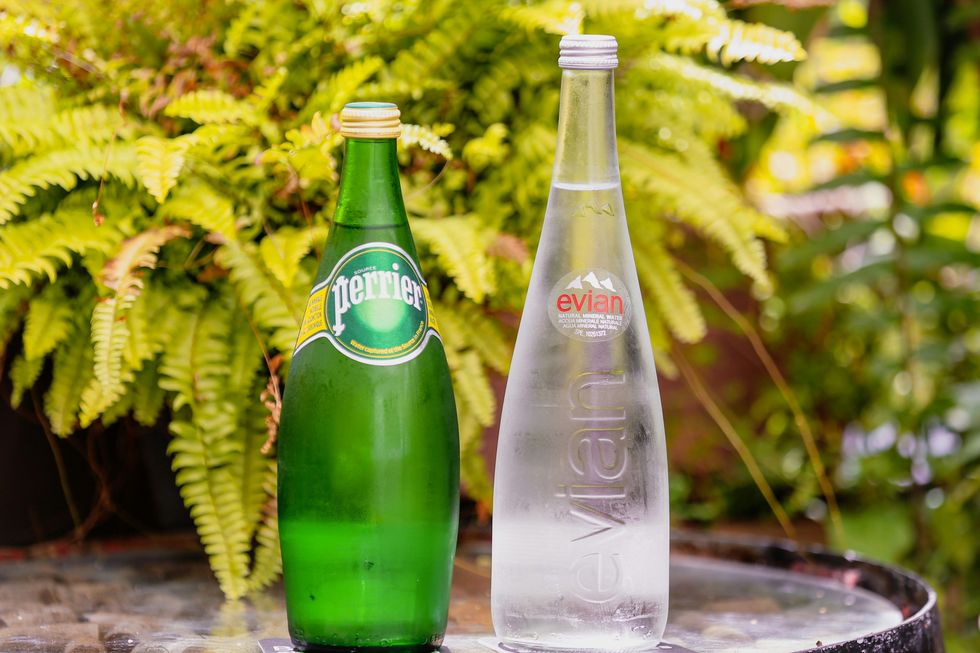
Unsplash
1. Invest in a Fun Water Bottle
There’s a far greater chance that you are going to drink water if you have a water bottle around you. So, cop yourself a cute one — one that will help you to stay motivated. A tumbler that I purchased some time back, just because I thought it was cute as hell, simply says, “Make Better Coochie Decisions” (amen?-LOL). Honestly, that doesn’t just have to apply to sex but how you treat your vagina overall — and that includes making sure that “she” has all of the fluids that she needs.
2. Try Some Sparkling Water or Mineral Water
At this point, I should take stock in Waterloo. It currently is my favorite kind of sparkling water and it has definitely made getting more water into my system easier to do. That’s because I will add some limes to it or a bit of fruit juice to it and that makes drinking water less “meh” for me. Another type of water that has bubbles in it is sparkling mineral water; it can also be beneficial since it contains magnesium, potassium and calcium.

Unsplash
3. Go Halfsies with Your Other Drinks of Choice
Speaking of making some all-natural soda (which is basically what happens when you add juice to sparkling water or sparkling mineral water), you can find yourself drinking more water while consuming less calories if you fill up your glass with half of your favorite fruit juice and half of some sparkling water. More times than not, the juice doesn’t even taste watered down. Try it before you doubt me.
4. Collect Some Infused Water Recipes
I’m forever gonna be a fan of infused water; that’s because it’s water that has fresh fruits and/or veggies in them — and it doesn’t get any healthier than that. Plus, infused water tends to take on the taste of whatever fruits or vegetables that you put into the water (if you let the stuff soak for a couple of hours), so that the water doesn’t taste so boring and bland. Wanna try a few recipes? You can check out some here and here.
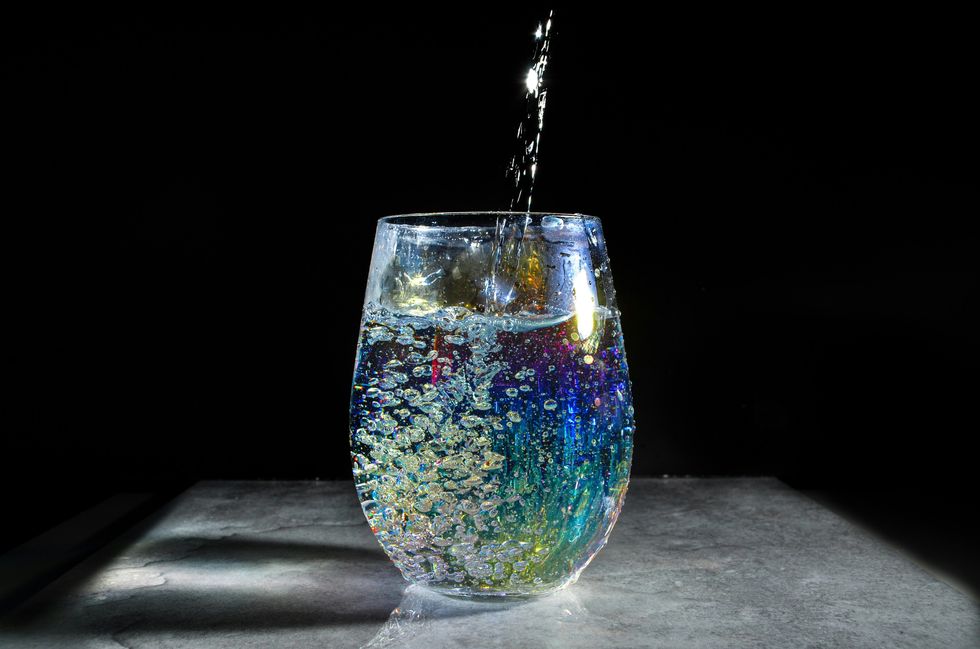
Unsplash
5. Make Slushies Instead of Smoothies
Are you someone who enjoys consuming smoothies? Well, if you want to get more water into your system, how about going with a slushie instead? Although it is true that some smoothies have water as a base, the most bomb ones use milk (or a milk alternative) or yogurt. Slushies, on the other hand, typically go with crushed ice (which is frozen water) instead. That said, some (pardon the pun) cool slushy recipes can be found here, here and here.
6. Use Water As Your “Drink Chaser”
Another great thing about water is it can help to keep you from overeating; it does that by causing you to feel full if you drink it while you are eating. And speaking of calorie-counting, if you don’t want to give up your favorite drink at mealtime, one way to keep from downing 2-3 glasses of it at a time is to use water as your “chaser.” What I mean by that is, after enjoying a glass of your favorite beverage, “chase it down” with a glass of water. That should satisfy your want for what you want without overdoing it.
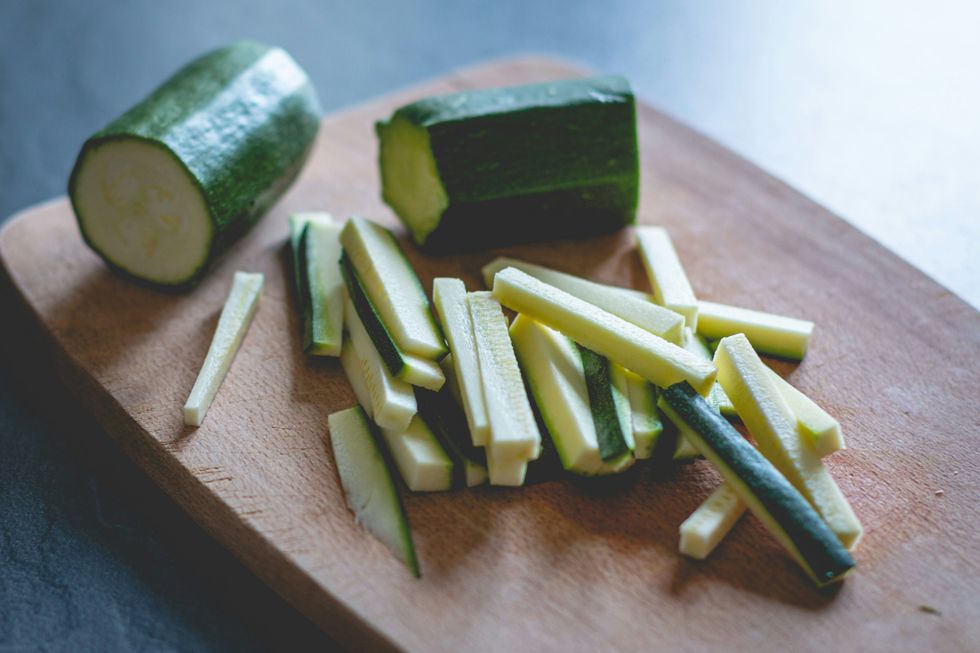
Unsplash
7. Eat Foods That Are High in Water Content
Another way to get more water into your body is to eat foods that have a ton of water in them. Some that top the list include lettuce (96 percent); cucumber (95 percent); zucchini (95 percent); celery (95 percent); strawberries (91 percent); cantaloupe (90 percent), and peaches (89 percent).
8. Have a Ball with Your Ice Cubes
Ice cubes are frozen water, right? That’s why most of us prefer to enjoy our drinks before the ice cubes melt because melted cubes water down whatever it is that we are consuming. And so, for this very reason, add more ice cubes to your drinks — and have fun making them. You can add juice, fruit and/or mint leaves while making your cubes. That way, they are aesthetically-pleasing; plus, they will also add more flavor to your water once the ice cubes actually melt.

Unsplash
9. Add Some Non-Alcohol Cordial to Your Water
If you’re fine with just having a tad of taste in your water, why not add a bit of cordial to it? Cordial is simply a type of tonic, syrup or sweetener (that can contain alcohol or not) that can help to make your water more…interesting. Some alcohol-based cordials can be found here. Some non-alcoholic recipes are located here.
10. Technically, Herbal Tea Counts
Tea is always gonna be my thing. That’s why I’ve penned articles on it for the site like “10 Different Ways Herbal Teas Can Fit Into Your Beauty Regimen”, “10 'Uncommon' Teas You Should Add To Your Stash (& Why)” and “I've Got 10 Teas That Will Help You To Age (Even More) Gracefully” And y’all, if you want to get a lot more water into your system yet a tall glass of water only isn’t your — pardon the pun — cup of tea, make some iced herbal tea instead.
It’s basically water with some herbs tossed in and, if you add some honey or raw organic coconut palm sugar to it, it will be a really sweet treat that will still be extremely hydrating (and very healthy) for you.
Water that is a bit more exciting for you…now. LOL.
Drink up!
Let’s make things inbox official! Sign up for the xoNecole newsletter for love, wellness, career, and exclusive content delivered straight to your inbox.
Featured image by Unsplash



